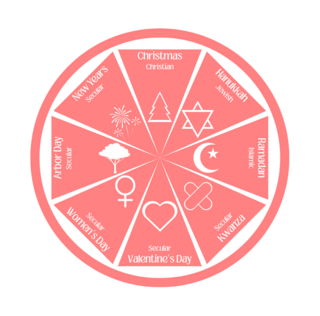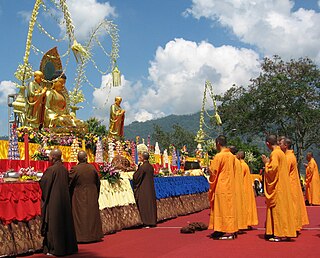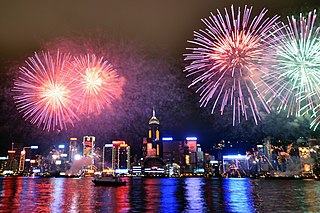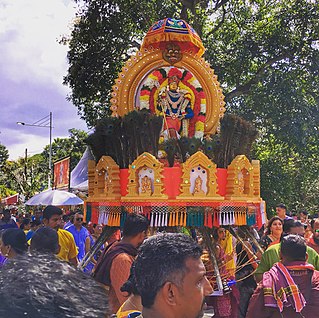The schedule of 11 public holidays in Singapore which are gazetted and recognized since the establishment of Singapore's 1998 Holidays Act. [1] [2]
The schedule of 11 public holidays in Singapore which are gazetted and recognized since the establishment of Singapore's 1998 Holidays Act. [1] [2]
There are generally 11 public holidays a year; however, since the gap between the Islamic calendar and the Gregorian calendar lasts around 11 days, Hari Raya Aidil Fitri and Hari Raya Aidil Adha are respectively celebrated twice in a Gregorian calendar year every 32 or 33 years. This occurred in 1968 and 2000 for Hari Raya Puasa as well as 1974 and 2006 for Hari Raya Haji, giving Singaporeans 12 public holidays in those years, not 13 since they are not close enough to be both celebrated twice in the same Gregorian year, only either one of the two. [3]
The list of all the holidays are as follows (listed in alphabetical order):
Under the Holiday's Act, should a Public Holiday falls on a Sunday, the following day on Monday would be gazetted as a public holiday (also called holiday-in-lieu). There are however, special occasions, that may be gazetted by the President of Singapore to declare any day to be observed as a public holiday by modifying any days specified in the schedule to the Holidays' Act and if any, another day to be observed as an additional public holiday when in that year two public holidays fall on the same day. [4] One such occasion occurred during the 2015's National Day, whereas an additional day of August 7 was gazetted as a public holiday in addition to August 10 being the holiday-in-lieu.
If any public holiday falls on a Saturday in Singapore, the following Monday is declared as a school holiday for students in primary & secondary schools, only if that Monday is not a public holiday itself.
Under Section 35 of the Parliamentary Elections Act and Section 17 of the Presidential Elections Act, Polling Day for a general election or a presidential election (but not By-elections) is a public holiday that is gazetted by the Returning Officer from the Elections Department Singapore. Under the Employment Act, employees not required to work on that day are entitled to one day off in lieu or be given one day's pay. [5]
Up to and including 1968, these few were also gazetted as public holidays but were removed to improve business competitiveness.
It is legal for employers to agree to give their employees other holidays in substitution for one or more public holidays. [6] No act or thing relating to any government department or public authority, any judicial proceeding, any transaction, instrument or any other act or thing is rendered invalid where it is done or executed on a Sunday or public holiday. [7]
Under the Employment Act, [8] an employee who is required to work on a public holiday is entitled to an extra day's salary at the basic rate of pay, in addition to the gross rate of pay for that holiday.
The days observed as general public holidays in Singapore are declared in the schedule to the Holidays Act. [9] According to the Ministry of Manpower, which issues a yearly list of the dates on which public holidays fall, the holidays were "chosen and agreed upon after close consultation with different community and religious leaders in Singapore". [3] Other factors taken into account were the impact on business costs and statutory leave provided for under the Employment Act. [10] Thus, some religious holidays such as Easter Monday, Mawlid (the birthday of Muhammad), Boxing Day and Thaipusam were removed from the list of public holidays to improve business competitiveness. [3]

Easter, also called Pascha or Resurrection Sunday, is a Christian festival and cultural holiday commemorating the resurrection of Jesus from the dead, described in the New Testament as having occurred on the third day of his burial following his crucifixion by the Romans at Calvary c. 30 AD. It is the culmination of the Passion of Jesus Christ, preceded by Lent, a 40-day period of fasting, prayer, and penance.

A holiday is a day or other period of time set aside for festivals or recreation. Public holidays are set by public authorities and vary by state or region. Religious holidays are set by religious organisations for their members and are often also observed as public holidays in religious majority countries. Some religious holidays, such as Christmas, have become secularised by part or all of those who observe them. In addition to secularisation, many holidays have become commercialised due to the growth of industry.

Vesak, also known as Buddha Jayanti, Buddha Purnima, Buddha Day, is a holiday traditionally observed by Buddhists in South Asia and Southeast Asia, as well as Tibet and Mongolia. It is the most important Buddhist festival. The festival commemorates the birth, enlightenment (Nibbāna), and passing (Parinirvāna) of Gautama Buddha in Theravada, Tibetan Buddhism and Navayana.

Eid al-Fitr is the earlier of the two official holidays celebrated within Islam. Eid al-Fitr is celebrated by Muslims worldwide because it marks the end of the month-long dawn-to-sunset fasting of Ramadan. Eid al-Fitr falls on the first day of Shawwal in the Islamic calendar; this does not always fall on the same Gregorian day, as the start of any lunar Hijri month varies based on when the new moon is sighted by local religious authorities. The holiday is known under various other names in different languages and countries around the world. The day is also called "Lesser Eid", or simply Eid.
Public holidays in Australia refer to the holidays recognised in law in Australia. Although they are declared on a state and territory basis, they comprise a mixture of nationally celebrated days and holidays exclusive to the individual jurisdictions.
These are the public holidays observed in Ireland. Public holidays in Ireland may commemorate a special day or other event, such as Saint Patrick's Day or Christmas Day. On public holidays, most businesses and schools close. Other services, for example, public transport, still operate but often with reduced schedules.

Lunar New Year is the beginning of a new year based on lunar calendars or, informally but more widely, lunisolar calendars. Lunar calendars follow the lunar phase while lunisolar calendars follow both the lunar phase and the time of the solar year. The event is celebrated by numerous cultures in various ways at diverse dates.

Thaipusam or Thaipoosam is a Tamil Hindu festival celebrated on the first full moon day of the Tamil month of Thai coinciding with Pusam star. The festival is celebrated to commemorate the victory of Hindu god Murugan over the demon Surapadman using a vel, a divine spear granted by his mother, Parvati.

Public holidays in New Zealand consist of a variety of cultural, national, and religious holidays that are legislated in New Zealand. Workers can get a maximum of 12 public holidays and a minimum of 20 annual leave days a year.
Bangladesh has numerous public holidays, including national memorial, religious and secular holidays of Bengali origin. The Bengali traditional calendar, known as Baṅgābda is the national and official calendar in Bangladesh. The holidays are celebrated according to Bengali, Islamic or Gregorian calendars for religious and civil purposes, respectively. Religious festivals like Eid are celebrated according to the Islamic calendar whereas other national holidays are celebrated according to the Bengali and Gregorian calendar. While the Islamic calendar is based on the movement of the moon, it loses synchronization with the seasons, through seasonal drift. Therefore, some public holidays are subject to change every year based on the lunar calendar.
Public holidays in Canada, known as statutory holidays, stat holidays, or simply stats, consist of a variety of cultural, nationalistic, and religious holidays that are legislated in Canada at the federal or provincial and territorial levels. While many of these holidays are honoured and acknowledged nationwide, provincial and territorial legislation varies in regard to which are officially recognized.

Public holidays in Malaysia are regulated at both federal and state levels, mainly based on a list of federal holidays observed nationwide plus a few additional holidays observed by each individual state and federal territory. The public holidays are a mix of secular holidays celebrating the nation and its history, and selected traditional holidays of the various ethnic and religious groups that make up the country.
In the United Kingdom, public holidays are days on which most businesses and non-essential services are closed. Many retail businesses do open on some of the public holidays. There are restrictions on trading on Sundays, Easter Day and Christmas Day in England and Wales and on New Year's Day and Christmas Day in Scotland. Public holidays defined by statute are called "bank holidays", but this term can also be used to include common law holidays, which are held by convention. The term "public holidays" can refer exclusively to common law holidays.

The Culture of Malaysia draws on the varied cultures of the different people of Malaysia. The first people to live in the area were indigenous tribes that still remain; they were followed by the Malays, who moved there from mainland Asia in ancient times. Chinese and Indian cultural influences made their mark when trade began with those countries, and increased with immigration to Malaysia. Other cultures that heavily influenced that of Malaysia include Persian, Arabic and British. The many different ethnicities that currently exist in Malaysia have their own unique and distinctive cultural identities, with some crossover.
Heroes' Day or National Heroes' Day may refer to a number of commemorations of national heroes in different countries and territories. It is often held on the birthday of a national hero or heroine, or the anniversary of their great deeds that made them heroes.

Public holidays in Botswana are largely controlled by government sector employers who are given paid time off. The government holiday schedule mainly benefits employees of government and government regulated businesses. At the discretion of the employer, other non-federal holidays such as Christmas Eve are common additions to the list of paid holidays.
Lists of holidays by various categorizations.

Presidents' Day, officially Washington's Birthday at the federal governmental level, is a holiday in the United States celebrated on the third Monday of February. It is often celebrated to honor all those who served as presidents of the United States and, since 1879, has been the federal holiday honoring Founding Father George Washington, who led the Continental Army to victory in the American Revolutionary War, presided at the Constitutional Convention of 1787, and was the first U.S. president.